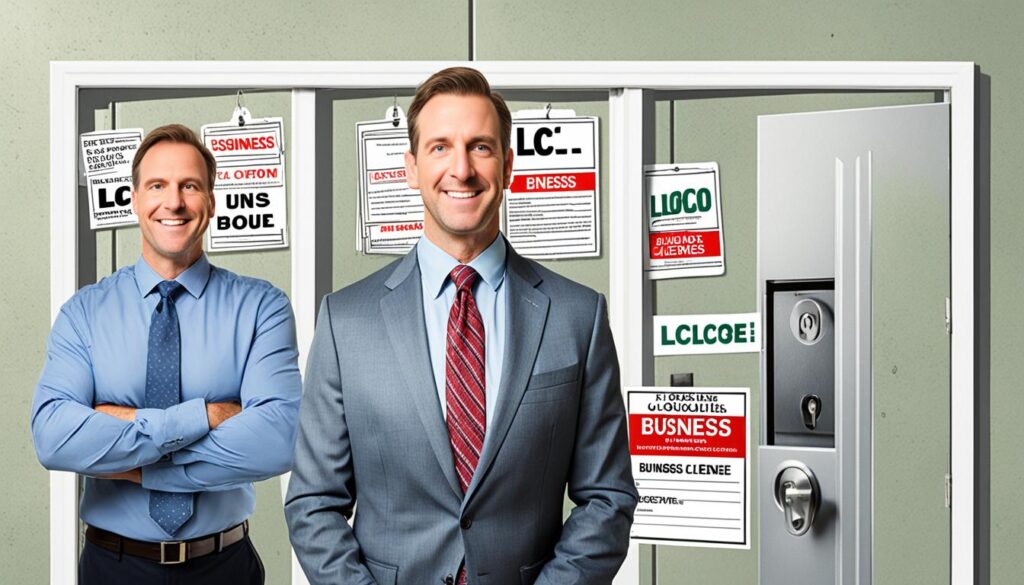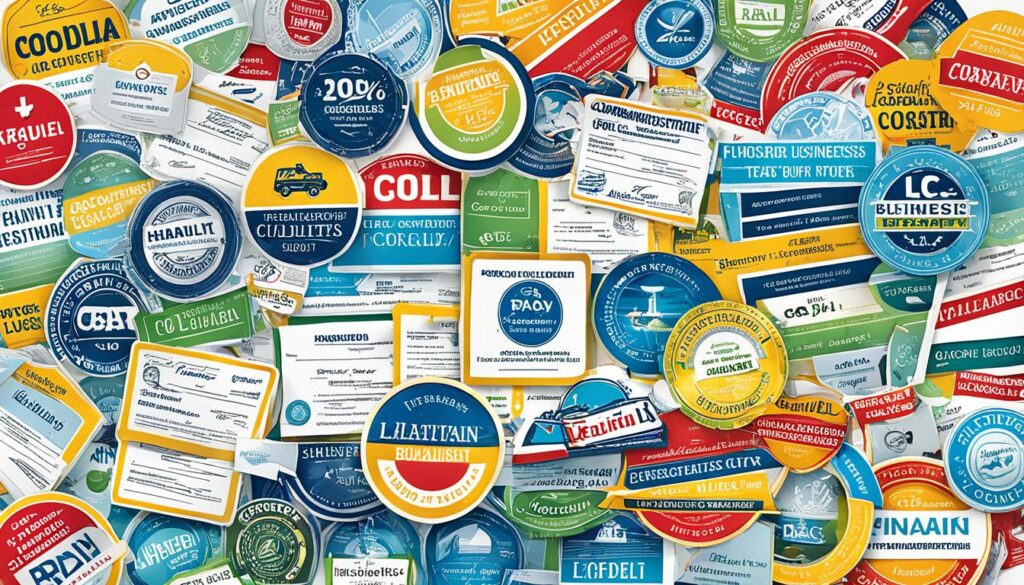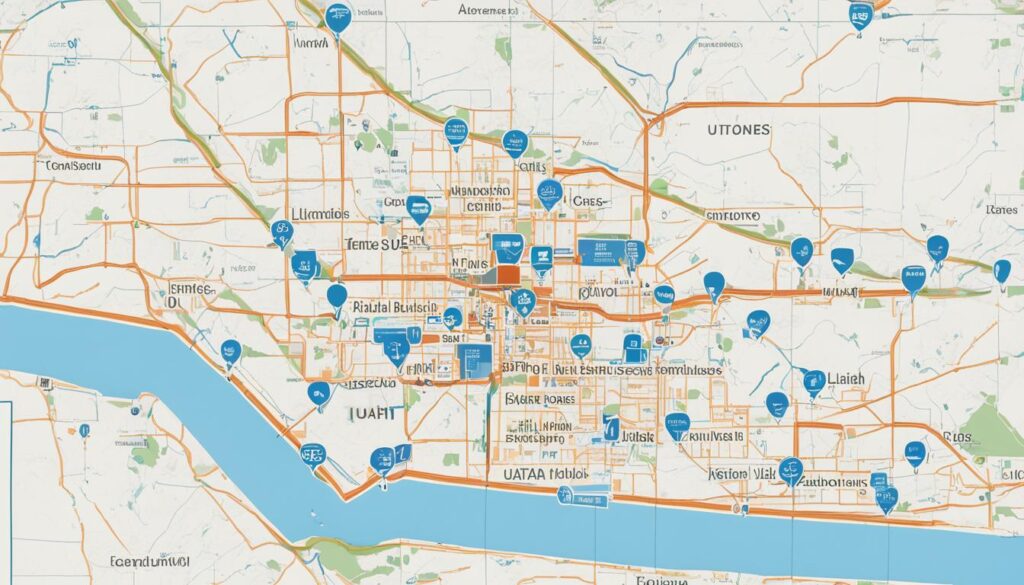Starting a business can be exciting, but it’s easy to get confused about legal requirements. You might wonder if an LLC is the same as a business license. Let’s clear up this common mix-up and explore the key differences between these two important business concepts.
An LLC, or Limited Liability Company, is a business structure that offers legal protection and tax benefits. A business license, on the other hand, is a permit that lets you operate in a specific area. Both are crucial for your business, but they serve different purposes.
Understanding the difference between an LLC and a business license is key for proper business registration and meeting operating requirements. As a business owner, you’ll likely need both to run your company legally and efficiently.
Key Takeaways
- An LLC is a type of business structure, not a license
- Business licenses are permits to operate in specific locations
- LLCs provide liability protection and tax benefits
- Most businesses need both an LLC and appropriate licenses
- Proper registration involves forming an LLC and obtaining necessary permits
Defining LLC and Business License
Starting a business means you’ll come across terms like LLC and business license. It’s key to know these terms for legal and business success.
What is an LLC?
An LLC is a business type that protects your personal stuff and offers tax benefits. It makes your business a separate legal thing. This way, your personal stuff is safe from your business debts and problems.
What is a business license?
A business license lets you legally run your business in a certain area. Governments give these licenses to make sure businesses follow the rules and keep everyone safe.
Key distinctions between LLCs and business licenses
LLCs and business licenses are both key for a business, but they’re for different things:
- An LLC is a structure that gives you legal protection and tax perks.
- A business license is a permit that lets you work in a certain place.
- You only need to set up an LLC once, but you might need many business permits based on what you do and where you do it.
- LLCs help organize your business overall, while licenses make sure you follow local laws.
Knowing these differences makes it easier to set up your business and get the right permits. This way, you can run your business legally and well.
The Purpose and Function of an LLC
An LLC is a strong choice for starting a business. It has special benefits that make it great for entrepreneurs. Let’s look at the main reasons to choose an LLC.
Shield Your Assets
Creating an LLC helps protect your assets. It keeps your personal wealth separate from your business debts. If your business has legal problems or debts, your personal stuff stays safe. This means you can focus on growing your business without worry.
Tax Perks
LLCs have flexible tax options. They usually get taxed in a way that avoids double taxation. You can also pick corporate tax if it’s better for you. This lets you adjust your taxes as your business changes.
Boost Your Credibility
Having an LLC makes your business look more professional. It shows you’re committed to your venture. The LLC structure gives your business a formal setup. This is great when you’re looking for funding or making contracts.
Starting an LLC takes a few steps. You need to pick a unique name, file papers, and choose a registered agent. It might seem hard, but the benefits are worth it. Knowing the differences between an LLC and a business license helps you make smart choices for your business.
Understanding Business Licenses and Their Requirements
Business licenses are key for legal operation in the U.S. They make sure your company meets local laws. You might need licenses from federal, state, or local levels, depending on your business type and location.
Licensing rules change a lot by industry and place. To start your business right, look into the specific rules for your area. This is vital for starting a successful business, whether it’s asphalt paving or another field.
Common types of licenses include:
- General business licenses
- Professional licenses
- Industry-specific permits
Local laws often tell you what licenses you need. Some businesses need many permits, while others just one. Always check with your local government to know what your business requires.
Before applying for licenses, collect all needed documents. This includes proof of business registration, tax ID numbers, and any important certifications. Being prepared can make applying for permits easier and quicker, helping you start your business sooner.
Is an LLC a Business License?
Many entrepreneurs mix up LLCs with business licenses, but they are not the same. They have different roles in business. Let’s set the record straight and see why you might need both for your business.
Common Misconceptions
An LLC is not the same as a business license. It’s a legal structure that protects your business and offers tax benefits. A business license, however, lets you do specific activities in your area.

Why You Might Need Both
Creating an LLC sets up your company’s legal structure. But, you’ll probably need business licenses too. These licenses make sure you follow local, state, and federal laws for your industry.
The Relationship Between LLCs and Licensing
LLCs and business licenses work together to keep your business legal. Just having an LLC doesn’t mean you don’t need licenses. Sometimes, an LLC might even need extra licenses based on what your business does.
- LLCs offer liability protection and tax benefits
- Business licenses let you operate in certain places
- Both are key for full legal compliance
Knowing the difference between LLCs and business licenses is crucial to avoid legal trouble. Always check on both the LLC and licensing needs for your business. This way, you can stay legal and run your business smoothly.
Steps to Forming an LLC and Obtaining Necessary Licenses
Starting a business means following certain steps for legal compliance and business registration. We’ll look at how to form an LLC and get the needed licenses.
Choosing a Business Name
Choose a unique name for your LLC that fits your state’s rules. Use your state’s business entity database to check if the name is available. Many states say the name must include “LLC” or “Limited Liability Company.”
Filing Articles of Organization
Submit articles of organization to your state’s business division to complete the filing process. This document lists your LLC’s name, address, and who owns it.
Selecting a Registered Agent
Pick a registered agent to get legal papers for your LLC. This can be someone or a professional service in your state.
Researching and Applying for Required Licenses
Look into the licenses your business needs based on its type and location. You’ll often need:
- General business license
- Sales tax permit
- Professional licenses
- Health department permits
Talk to your local government to find out about legal requirements. Remember, the process changes by state and industry. So, do your homework to make sure your business follows the law.
Benefits of Having Both an LLC and Proper Business Licensing

Having an LLC and the right licenses is a strong combo for your business. An LLC protects your personal stuff from business debts. It also lets you pick how your business is taxed, saving you money.
Getting the right licenses shows you follow the law and are serious about your business. This makes your business look good to others. People like clients, partners, and banks see you as more trustworthy with an LLC and licenses.
The perks of this combo include:
- Enhanced credibility in the marketplace
- Increased chances of securing contracts and financing
- Avoidance of potential fines or legal issues
- Improved customer trust and satisfaction
Setting up an LLC and getting licenses lays a solid base for your business. It keeps you safe legally and helps your business grow. New York entrepreneurs can really gain from this, getting ready for the tough business world.
Conclusion: Navigating LLC Formation and Business Licensing
Starting a business takes more than just a great idea. You must understand the legal steps needed. An LLC protects your personal assets, while a license lets you operate legally.
As an entrepreneur, knowing the difference between these is crucial. Many resources are available to help you understand. You might need both an LLC and specific licenses, based on your industry and location.
Don’t let legal details hold you back from starting your business. Get help from experts who know the rules. They can help you with forming an LLC and getting the right licenses. With the right setup and permits, you can make your business dreams come true.
FAQ
What is the difference between an LLC and a business license?
Do I need both an LLC and a business license to operate my business legally?
What are the key benefits of forming an LLC?
What types of business licenses might I need?
Can I operate my business without forming an LLC or obtaining licenses?
How do I form an LLC and obtain the necessary licenses?
Author
-

David Nguyen is an expert in business licensing, with extensive knowledge in local and international regulations. His expertise is crucial for businesses seeking guidance on compliance and licensing strategies.
View all posts



